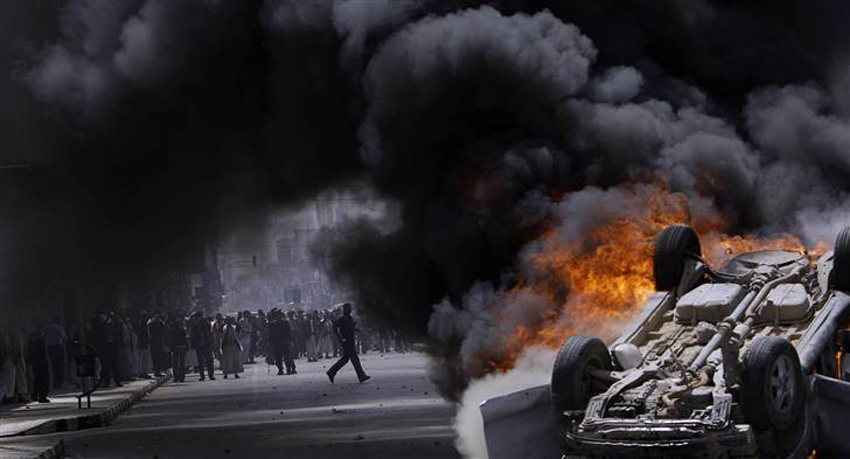Alwaght- The Saudi-Led coalition against Yemen was the main subject discussed in the agenda of the 26th session of the Arab Summit. The Arab summit began in the Egyptian resort town of Sharm el-Sheikh on Saturday. Kuwaiti Foreign Minister Sheikh Sabah Khalid Al-hamad Al-sabah, who had presided over last year's summit, gave the floor to the Egyptian President El-Sisi.
In his speech, the Egyptian President El-Sisi called military action in Yemen “inevitable”. He also said that Egypt has accepted the proposal by the Arab foreign ministers to form a joint Arab military force. He further, added that Arab countries are facing unprecedented threats to their stability and identity. El-Sis called on the summit to tackle the issue of nuclear weapons, to establish a nuclear weapons-free Middle East.
Concerning the Palestine issue, the Egyptian President El-Sisi said that "our hearts and minds are open for peace to all sides", a peace that mandates that Israel evacuates occupied Palestinian lands and halt its settlement activities.
Moreover, regarding the situation in Libya El-Sisi explained that the situation in Libya is becoming increasingly complex, due to the international silence about what is happening. He also expressed regret for the continuation of the crisis in Syria which threatens the security of the region.
Fugitive Hadi calls for the continuation of the "Decisive storm"
Abd-Rabbu Mansour Hadi, also attended the summit, said that the military operation in his country is aimed at defending the Yemeni people. Hadi thanked all Persian Gulf Cooperation Council state and all other countries supporting the coalition that led strikes in Yemen for their economic, political and military support of Yemen. Moreover, Hadi also called for the continuation of the Saudi-led operations.
Salman Bin Abdul Aziz claims, “The Gulf states have responded to the call the Yemeni president”
For his part, the Saudi king Salman Bin Abdul Aziz said “The excruciating reality of terrorism, internal conflicts, and bloodshed experienced by a number of Arab countries are only the inevitable result of an alliance between terrorism and sectarianism”, Salman further said “In Yemen, the foreign intervention enabled the Houthi militias to overtake the legitimate authority.” Salman said that the situation in the region necessitates an Arab coalition to fight terrorism and assured “The Determination Storm operation will continue until these objectives are achieved, so that the Yemeni people are able to enjoy security and stability.”
Qatari Emir Tamim: Ansarullah movement and supporters of Saleh bear the responsibility for the escalation in Yemen
In the same context, the Emir of Qatar Tamim Bin Hamad Al Thani alleged that Ansarullah movement has rejected the national dialogue.
The Emir of Qatar in his speech to the twenty-sixth of the Arab summit held in Sharm el-Sheikh conference said, "The Syrian regime is not part of any future solution."
Kuwaiti Emir Al-Sabah: The Persian Gulf Cooperation Council has the right to defend itself
Kuwaiti Emir Sheikh Sabah al Ahmad al Jaber al Sabah addressed the inaugural session of the 26th Arab Summit on Saturday.
During his speech, he claimed that Kuwait was among the first to support the operation to bring an end to the Ansarullah Movement’s aggression on the legitimate leadership in Yemen, taking control of key facilities in the country, and threatening Saudi Arabia, the Persian Gulf Cooperation Council countries and the entire region.
Al-Sabah further claimed “After all peaceful means to find a solution failed and upon a call by the Yemeni president for intervention and in line with the GCC Defence Pact and the Arab Treaty of Joint Defence, Arabs stood up to defend Yemen.”
Hamad bin Isa Al Khalifa: the common Arab force to confront any aggression threatens the security of Arab states
Regarding the Yemeni assault Hamad said “The military operation in Yemen was a necessary move required by the Arab League Charter and the Joint Arab Defence Pact. It was also aimed to re-affirm Arab solidarity with Yemen and its legitimate leadership, and keenness to maintain its sovereignty and independence.” As the Kuwaiti leadership, he claimed, “Such a step was taken only after all means and regional and international efforts to contain the crisis, most notably the GCC Initiative and its executive mechanisms, approved by all Yemenis, had been exhausted.”



























